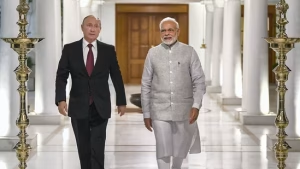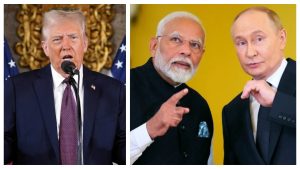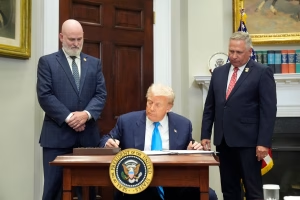New Delhi – Russia On Trump Threats has escalated significantly as the Kremlin strongly condemned recent US warnings against India regarding its trade relationships with Moscow. Kremlin spokesperson Dmitry Peskov delivered a forceful response on Tuesday, declaring that American attempts to force countries to cease trading with Russia constitute illegal actions under international law.
The Russia On Trump Threats controversy emerged following President Donald Trump’s warning to India about potential tariff revisions due to New Delhi’s continued purchase of Russian oil. Peskov’s statement represents Moscow’s most direct challenge to Washington’s efforts to isolate Russia economically through threats against third-party nations.
Speaking to reporters, Peskov emphasized that sovereign nations possess fundamental rights to choose their own trading partners without external coercion. The Kremlin spokesperson’s remarks signal Russia’s determination to protect its international commercial relationships despite mounting pressure from the United States.
Kremlin’s Strong Statement Against US Trade Coercion

The Russia On Trump Threats situation intensified when Peskov told reporters that “trying to force countries to stop trading with Russia is illegal.” This declaration represents Moscow’s formal position that American threats against nations maintaining commercial ties with Russia violate international legal principles.
Peskov further elaborated that countries maintain inherent rights to select their own trade partners, making such coercive threats fundamentally inappropriate. The Kremlin spokesman characterized these pressures against Russia’s trading partners as direct “threats” that Moscow will not tolerate silently.
The Russia On Trump Threats controversy highlights deeper tensions between Washington and Moscow over economic warfare tactics. Russia’s response demonstrates its commitment to defending not only its own interests but also the sovereignty of nations choosing to maintain trade relationships with Moscow despite US pressure.
Detailed Kremlin Response to US Pressure Tactics


Regarding the Russia On Trump Threats issue, Peskov provided comprehensive remarks to reporters explaining Moscow’s position. “We hear many statements that are in fact threats, attempts to force countries to cut trade relations with Russia. We do not consider such statements to be legal,” the Kremlin spokesperson declared.
The Russian official continued by emphasizing fundamental principles of international commerce: “We believe that sovereign countries should have and do have the right to choose their own trading partners, partners for trade and economic cooperation, and to choose for themselves the forms of trade and economic cooperation that are in the interests of a particular country.”
These statements represent Russia’s most detailed response to the Russia On Trump Threats controversy, establishing clear boundaries regarding what Moscow considers acceptable international behavior versus illegal coercion attempts.
Also Read: Ukraine on Russian Drones: Explosive Diplomatic Crisis Over Use Of Indian Components
Trump’s Warning Against India Triggers International Response


The Russia On Trump Threats situation originated from President Trump’s Monday night warning to India regarding its continued purchase of Russian oil and military products. Trump’s statement came amid his broader efforts to establish a ceasefire in Ukraine, linking India’s trade relationships with Russia to the ongoing conflict.
Trump’s warning specifically criticized India’s oil purchasing practices: “India is not only buying massive amounts of Russian Oil, they are then, for much of the Oil purchased, selling it on the Open Market for big profits. They don’t care how many people in Ukraine are being killed by the Russian War Machine. Because of this, I will be substantially raising the Tariff paid by India to the USA.”
This statement prompted both the Russia On Trump Threats response from Moscow and strong reactions from New Delhi, creating a three-way diplomatic tension involving major global powers.
India’s Defiant Response to US Pressure
The Russia On Trump Threats controversy expanded when India issued its own strong-worded statement rejecting American pressure. The Indian Ministry of External Affairs accused the United States and European Union of unfairly targeting New Delhi over its trade relationships.
“The targeting of India is unjustified and unreasonable. Like any major economy, India will take all necessary measures to safeguard its national interests and economic security,” read the official Indian government statement.
This response demonstrates that the Russia On Trump Threats situation has created broader international tensions, with multiple nations rejecting US attempts to control their trade relationships through coercive measures.
Escalating Trade War and Tariff Implementation

The Russia On Trump Threats controversy coincides with actual economic measures being implemented by the Trump administration. Starting August 1, India faced 25 percent tariffs imposed by the United States, representing a significant escalation in trade tensions.
According to Trump’s official announcement, these tariffs result from New Delhi’s tariffs on American goods, which the US president characterized as “the highest in the world.” This economic pressure campaign demonstrates the practical implications of the broader Russia On Trump Threats diplomatic crisis.
International Implications and Future Tensions
The Russia On Trump Threats situation reflects broader global tensions over economic sovereignty and trade independence. Moscow’s strong response signals that Russia will actively challenge US attempts to isolate it economically through third-party pressure campaigns.
This controversy highlights fundamental questions about international law, sovereign rights, and the limits of economic coercion in modern diplomacy. The Russia On Trump Threats debate may establish important precedents for how nations respond to external pressure regarding their trade relationships and economic partnerships in an increasingly multipolar world.

